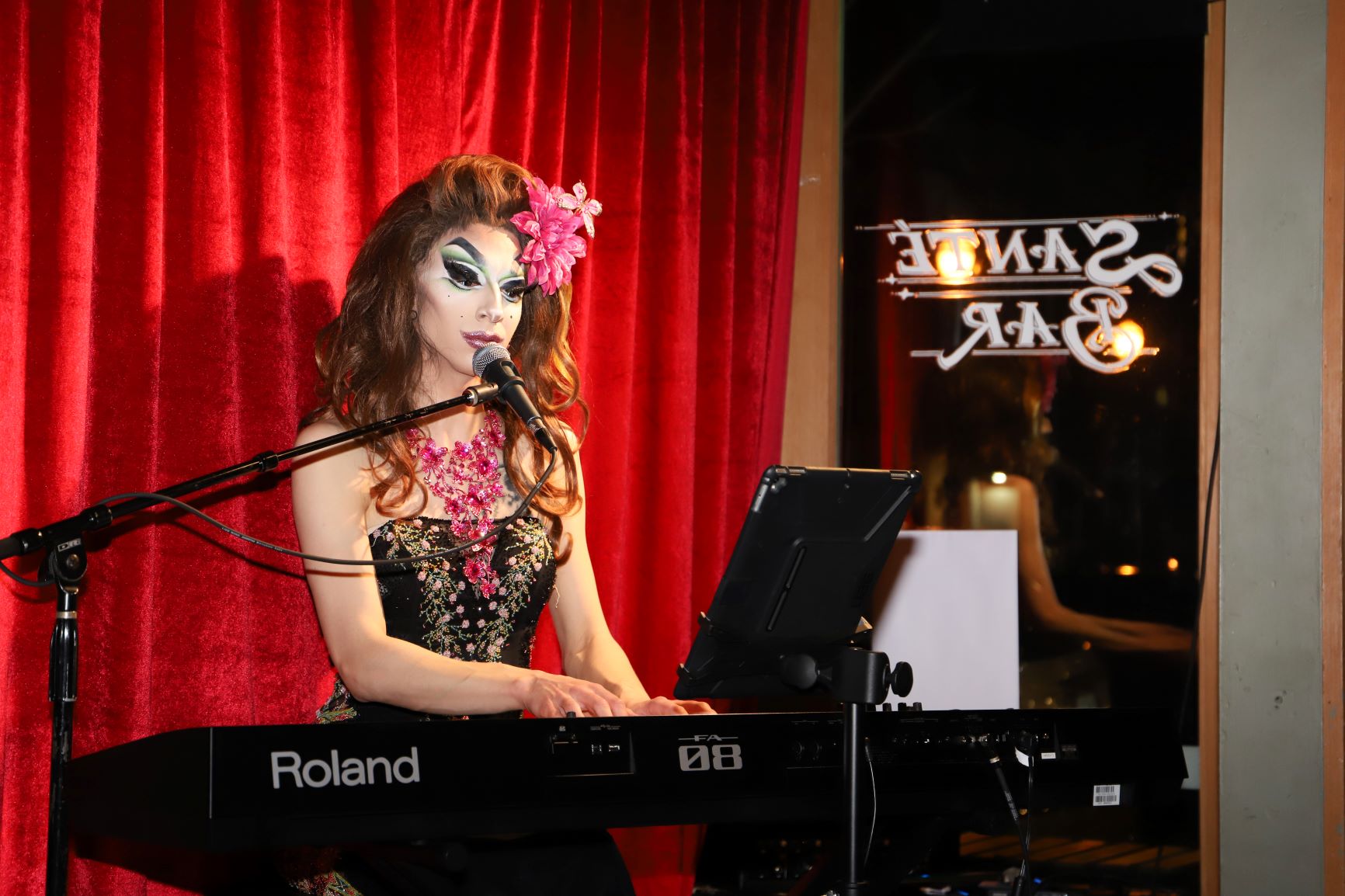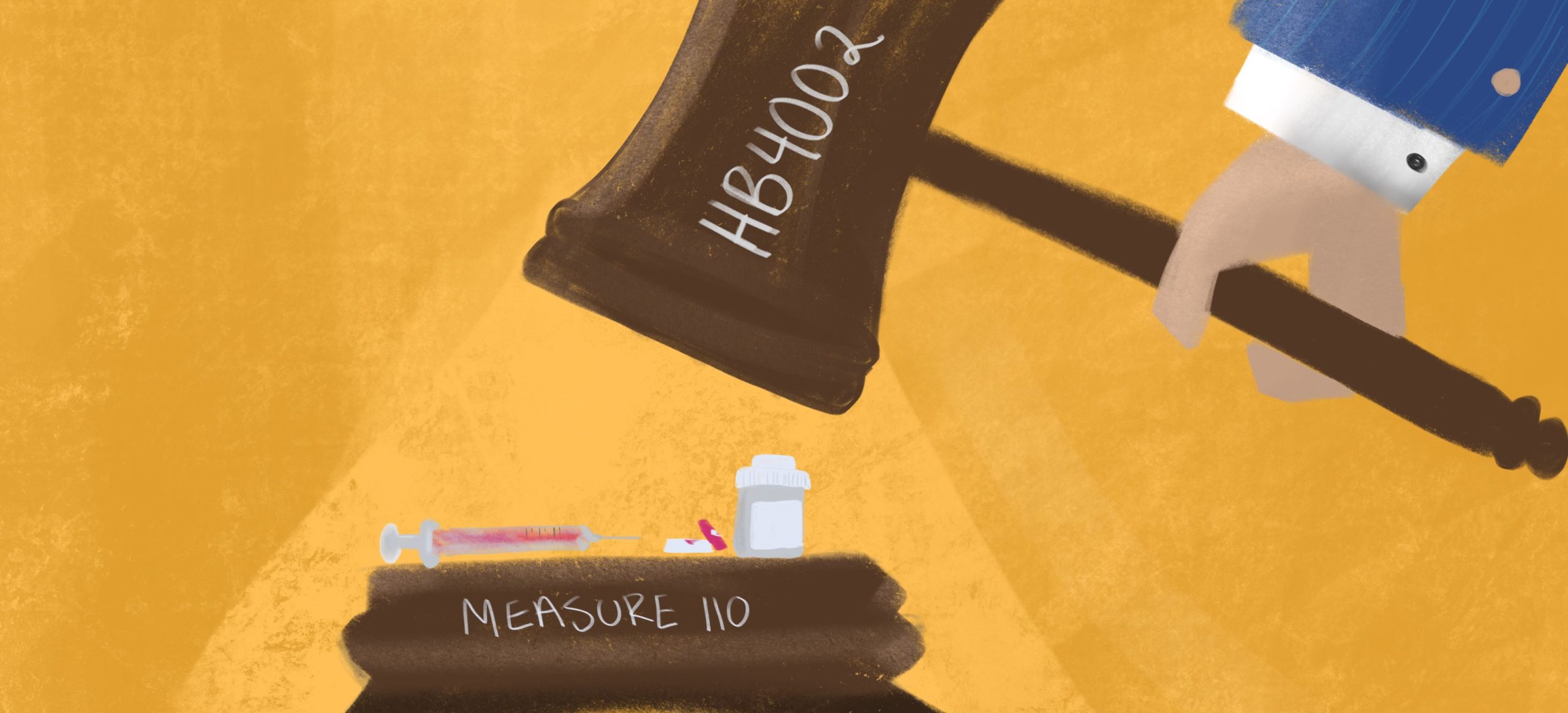While singing a rousing rendition of “Man, I Feel Like a Woman” to a backing track, Saint Syndrome sat behind the Roland FA-08 keyboard—featuring 88 weighted keys, among other electronic gewgaws and doodads—and introduced herself.
“I’m the smallest—damn it— the lowest bass with the smallest waist: Portland’s only piano playing drag queen.” Neither an ordinary saint nor an ordinary woman, Saint Syndrome is the drag name for local musician Marshall Cuffe.
Some background on Marshall Cuffe is necessary to understand Saint Syndrome: While studying classical piano performance and psychology at Lawrence Conservatory in Appleton, Wisconsin, Cuffe craved an opportunity to combine these subjects with his interest in drag and burlesque culture.
Although RuPaul’s Drag Race was a longtime favorite and inspiration, it was a “smart, critical treatment” of a vintage tune at a show in Chicago that inspired him to combine his training in classical music with his inner queen. Although the details of the show have slipped from memory, the inspiration it instilled in Cuffe—breaking out of the conventional classical piano technique, uniting classical and current music in the same performance and doing it all in a dress and heels—remains.
“I want to push the envelope of appropriate Chopin playing,” Cuffe said. As a classical musician in a recital setting, the expectations are very rigid, Cuffe explained, but the format of drag shows allows for much more freedom of playing style, repertoire and presentation.
“I love bringing people into drag and not having it be something that’s scary,” Cuffe said. The Saint Syndrome show is designed to be a “gateway” into the drag world.
“We’re going to pretend that Pink Martini wrote this for me,” Saint said while introducing Pink Martini’s gender-bending song “Bitty Boppy Betty” at her recent performance at Santé Bar. The microphone boom arm sagged slightly during the first tunes, prompting a bit of banter to accompany Saint’s extempore repair.
Quips easily find themselves worked into Miss Syndrome’s performances—her sense of humor, an element not confined to her onstage banter, but a necessary mechanism for the songs she revises. She considers her reimagining of Billy Joel’s “Piano Man” as “Piano Queen”—which lyrically describes and playfully chaffs queer culture—to be one of her signature tunes. “She’s really playing, I know,” Saint said in mock self-commentary during an instrumental interlude.
The next three numbers formed what Saint called a “sad sandwich”—the gaiety of “I Feel Pretty” from Bernstein’s West Side Story, the filling between the pathos bread of “Pretty Funny” from Dogfight and Funny Girl’s title track. “Pretty Funny” resonates with Saint because in general, performing “sometimes feels empty because you’re wearing a full-body mask, and it’s hard to separate that from who you are.” Her face is included in this full body mask when it comes to her tackles of “Funny Girl,” which Saint remarks as part of her affinity for Barbra Streisand. “Barbra and I share a nose—deep connection there.”
As if the variety of Saint’s first set wasn’t proof enough, her second set further demonstrated the eclecticism in her crafted repertoire. After opening with “Poisoning Pigeons in the Park,” Tom Lehrer’s satirical paean to springtime avian population control, Chopin’s “Nocturne in Eb Major (Op. 9 No. 2)” and a medley of sardonically triumphant self-referential showbiz songs from the musical Applause followed.
She’s got a bit of everything on her performative docket, pulling motley tracks out of her magic discographical bag like Mary Poppins—a raucous take on the Garth Brooks barroom sing-along classic “Friends in Low Places” took on a different meaning in drag, rather than a honky-tonk setting.
For her closing track, she took a different, less waggish turn. Striking a somber note, Saint said, “This is my benediction, this is my goodbye,” before performing the Rodgers and Hart classic “Where or When.”
“I love you all, thank you” were the last utterances she left the audience with.
That final doleful tune and parting expression of gratitude closed a show evoking everything from the silly to the dark to the self-deprecating to the transcendent. Saint Syndrome appeals to those who are unfamiliar with drag culture and performance, longtime drag devotees interested in seeing live music and anyone interested in a broad and catholic musical taste. Support our local musicians and artists, especially those blazing their own trails.
Saint Syndrome’s next performance is at 8:30 p.m. on April 27 at Santé. There is no cover charge. Visit saintsyndrome.com for more information.






